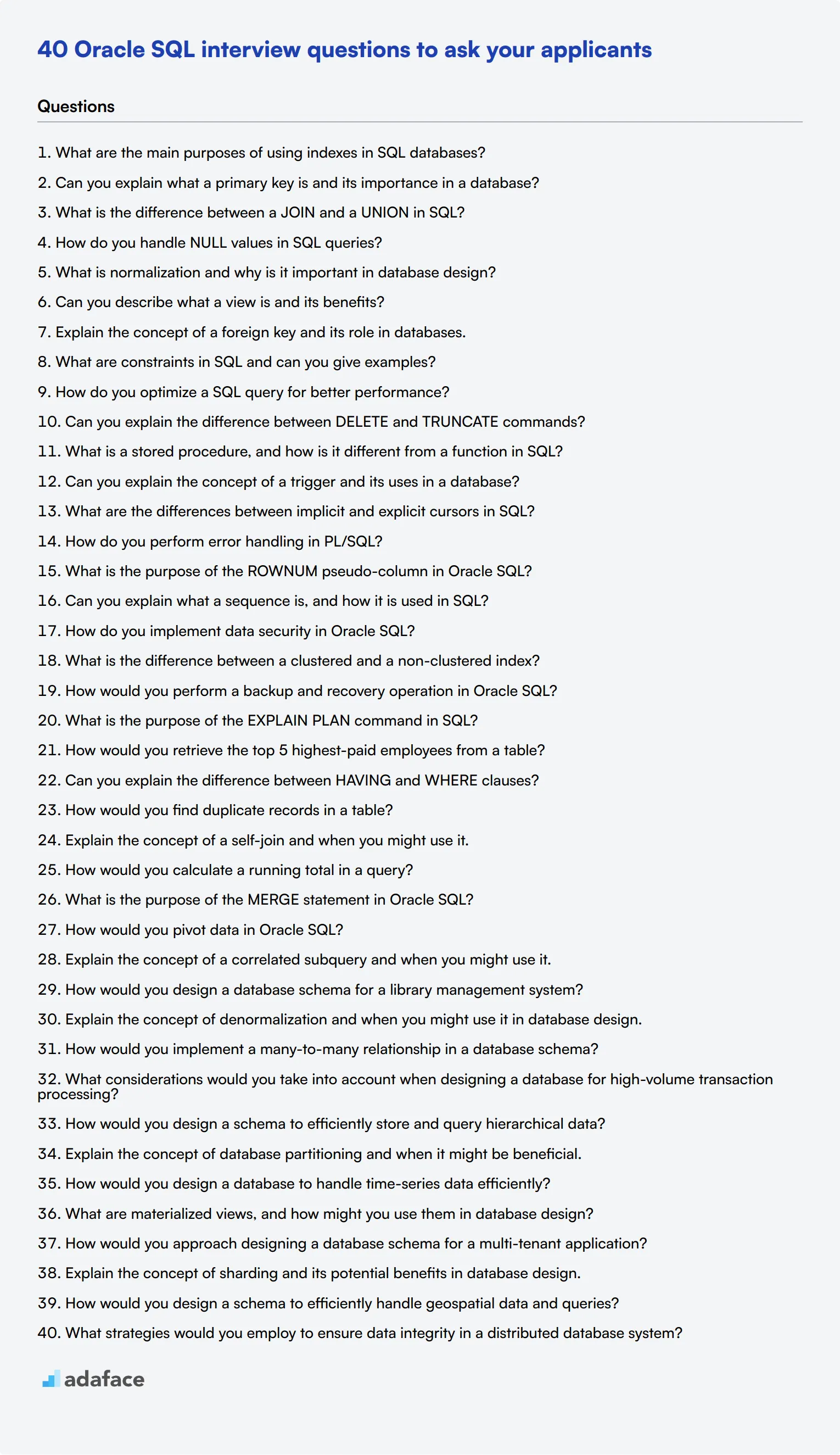Recruiting the best Oracle SQL talent can be daunting, even for experienced hiring managers. This list of Oracle SQL interview questions will help streamline your interviewing process and pinpoint candidates with the right skills and knowledge. SQL developer job description.
The blog post is segmented into different categories, such as basic, junior database administrators, SQL queries, and database design questions. Each section provides well-crafted questions and model answers to evaluate the technical proficiency of candidates at various levels.
Using this list of interview questions, you can efficiently assess Oracle SQL skills to ensure you're hiring the best fit for your team. Pair this with our Oracle PL/SQL online test to screen candidates before the interview and optimize your hiring process.
Table of contents
10 basic Oracle SQL interview questions and answers to assess applicants

To determine if your candidates have a solid understanding of Oracle SQL, we've compiled a list of essential interview questions. These questions are designed to gauge both foundational knowledge and practical experience, ensuring you find the right fit for your team.
1. What are the main purposes of using indexes in SQL databases?
Indexes are used to speed up the retrieval of rows by using pointers. They can drastically improve the performance of SELECT queries and WHERE clauses by reducing the number of data pages read to find a particular data value.
However, indexes come with a trade-off. While they speed up read operations, they can slow down write operations such as INSERT, UPDATE, and DELETE since the indexes need to be updated. An ideal candidate should demonstrate a balanced understanding of when and how to use indexes effectively.
2. Can you explain what a primary key is and its importance in a database?
A primary key is a unique identifier for a record in a database table. It ensures that each record can be uniquely identified, which is crucial for maintaining data integrity. Primary keys cannot contain NULL values and must contain unique values.
Look for candidates who can explain the significance of primary keys in maintaining data integrity and how they help in establishing relationships between different tables in a relational database.
3. What is the difference between a JOIN and a UNION in SQL?
A JOIN is used to combine rows from two or more tables based on a related column between them. JOINs retrieve data from multiple tables and create a single set of data.
On the other hand, a UNION is used to combine the result sets of two or more SELECT statements. The SELECT statements within the UNION must have the same number of columns in the result sets with similar data types.
Ideal candidates should clearly articulate the differences and provide examples of scenarios where each operation would be most appropriate.
4. How do you handle NULL values in SQL queries?
NULL values represent missing or unknown data. Handling NULL values properly is crucial for accurate query results. Functions like IS NULL and IS NOT NULL can be used to filter records with NULL values.
The COALESCE function can be used to return the first non-NULL value in a list, and the NULLIF function returns NULL if two expressions are equal. Candidates should demonstrate a clear understanding of these functions and their practical applications in handling NULL values.
5. What is normalization and why is it important in database design?
Normalization is the process of organizing data in a database to reduce redundancy and improve data integrity. It involves dividing large tables into smaller, related tables and using foreign keys to link them.
The primary goal of normalization is to eliminate data anomalies and provide a consistent and efficient structure. Candidates should be able to explain various normal forms and their importance in ensuring a robust database schema.
6. Can you describe what a view is and its benefits?
A view is a virtual table that is based on the result set of a SQL query. Views can be used to simplify complex queries, enhance security by restricting access to specific data, and provide a layer of abstraction over the underlying table structure.
Candidates should mention that views do not store data physically but provide a way to present data in a specific format. Look for an understanding of how views can be utilized effectively in database management.
7. Explain the concept of a foreign key and its role in databases.
A foreign key is a field (or a collection of fields) in one table that uniquely identifies a row of another table. The main role of a foreign key is to maintain referential integrity between two tables by ensuring that the value in the foreign key column matches a value in the primary key column of the referenced table.
An ideal candidate should explain how foreign keys are used to establish and enforce linkages between tables, ensuring data consistency and integrity across the database.
8. What are constraints in SQL and can you give examples?
Constraints are rules enforced on data columns in a table to ensure the accuracy and reliability of the data. Common types of constraints include NOT NULL, UNIQUE, PRIMARY KEY, FOREIGN KEY, CHECK, and DEFAULT.
Candidates should give examples like ensuring a column cannot accept NULL values (NOT NULL), ensuring all values in a column are unique (UNIQUE), or setting a default value for a column (DEFAULT). Look for a clear understanding of how these constraints help maintain data integrity.
9. How do you optimize a SQL query for better performance?
Optimizing SQL queries involves several techniques such as using indexes, avoiding unnecessary columns in SELECT statements, using JOINs appropriately, and writing efficient WHERE clauses.
Candidates should also mention the importance of understanding the execution plan of a query to identify bottlenecks. Look for practical examples and an understanding of how to balance query readability and performance.
10. Can you explain the difference between DELETE and TRUNCATE commands?
DELETE is a DML command that removes rows from a table based on the condition specified in the WHERE clause. It can be rolled back if used within a transaction. DELETE operations also fire triggers if they are defined on the table.
TRUNCATE, on the other hand, is a DDL command that removes all rows from a table, releasing the storage space. It cannot be rolled back and does not fire triggers. Candidates should show an understanding of when to use each command appropriately based on the requirements.
10 Oracle SQL interview questions to ask junior database administrators
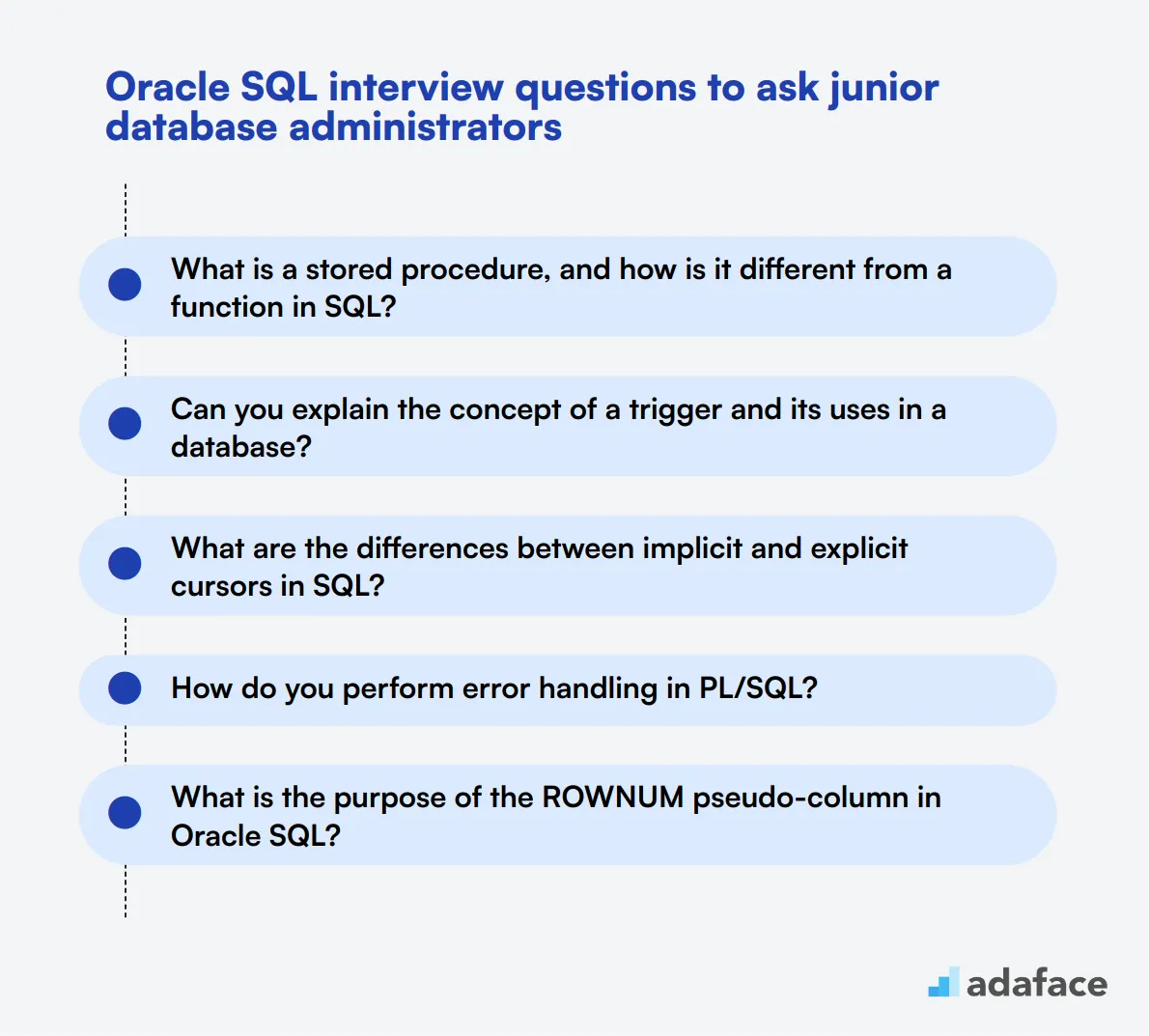
To ensure that your candidates possess the necessary knowledge for a junior database administrator role, use these 10 Oracle SQL interview questions. They will help you gauge their technical understanding and familiarity with essential database concepts, making your hiring process more effective. For more detailed insights, you can refer to our database administrator job description.
- What is a stored procedure, and how is it different from a function in SQL?
- Can you explain the concept of a trigger and its uses in a database?
- What are the differences between implicit and explicit cursors in SQL?
- How do you perform error handling in PL/SQL?
- What is the purpose of the ROWNUM pseudo-column in Oracle SQL?
- Can you explain what a sequence is, and how it is used in SQL?
- How do you implement data security in Oracle SQL?
- What is the difference between a clustered and a non-clustered index?
- How would you perform a backup and recovery operation in Oracle SQL?
- What is the purpose of the EXPLAIN PLAN command in SQL?
8 Oracle SQL interview questions and answers related to SQL queries
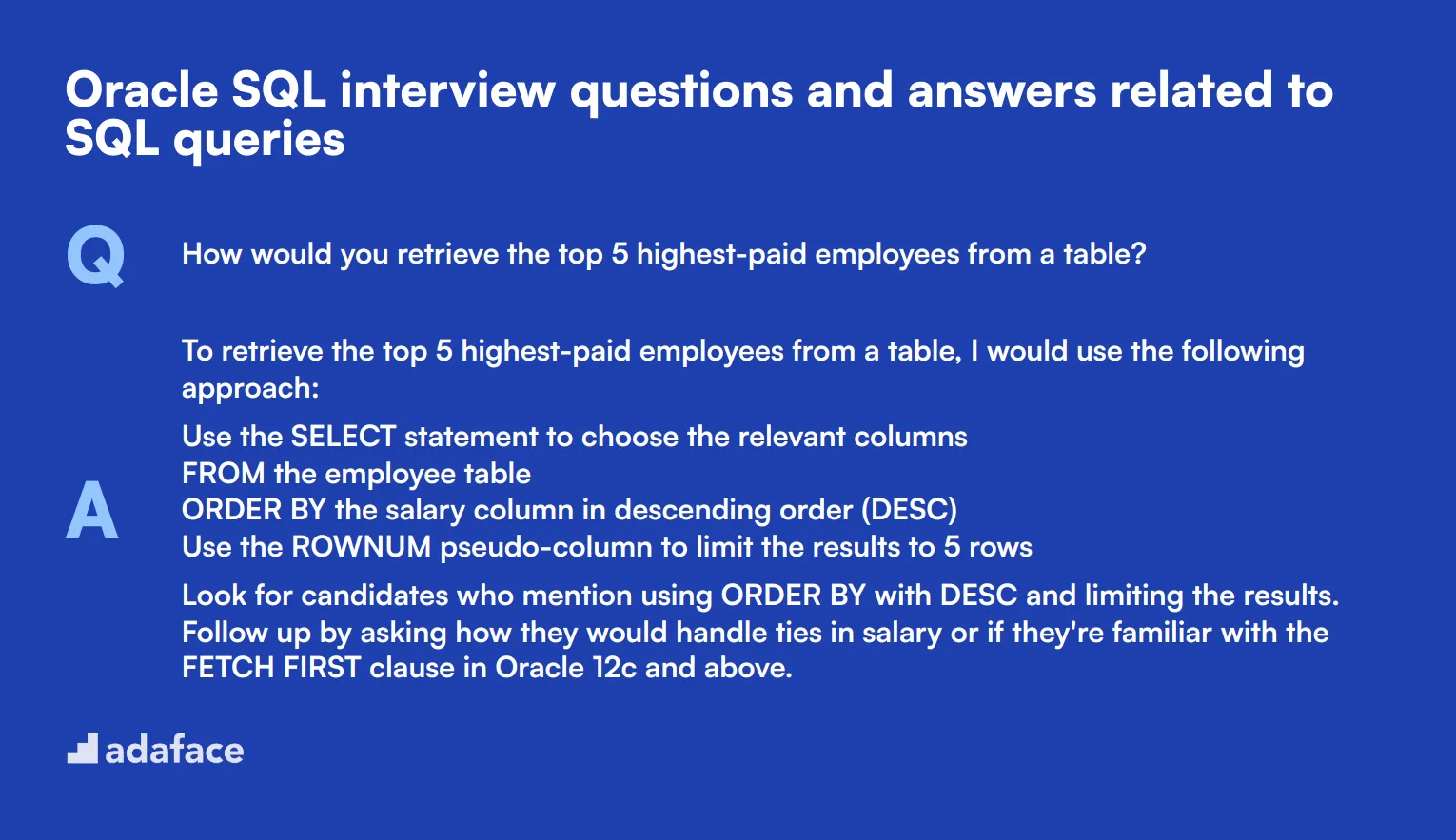
Ready to dive into the world of Oracle SQL? These eight interview questions will help you gauge a candidate's understanding of SQL queries. Whether you're hiring a database developer or a data analyst, these questions will give you insight into their SQL prowess. Use them to spark discussions and uncover the depth of their knowledge.
1. How would you retrieve the top 5 highest-paid employees from a table?
To retrieve the top 5 highest-paid employees from a table, I would use the following approach:
- Use the SELECT statement to choose the relevant columns
- FROM the employee table
- ORDER BY the salary column in descending order (DESC)
- Use the ROWNUM pseudo-column to limit the results to 5 rows
Look for candidates who mention using ORDER BY with DESC and limiting the results. Follow up by asking how they would handle ties in salary or if they're familiar with the FETCH FIRST clause in Oracle 12c and above.
2. Can you explain the difference between HAVING and WHERE clauses?
The HAVING and WHERE clauses serve different purposes in SQL queries:
- WHERE is used to filter individual rows before any groupings are made
- HAVING is used to filter groups after GROUP BY has been applied
- WHERE is used with SELECT, UPDATE, and DELETE statements
- HAVING is only used with the SELECT statement in conjunction with GROUP BY
A strong candidate should be able to provide examples of when to use each clause. Consider asking them to describe a scenario where both WHERE and HAVING might be used in the same query to further test their understanding.
3. How would you find duplicate records in a table?
To find duplicate records in a table, I would use the following method:
- Use the SELECT statement with the columns that should be unique
- Apply the GROUP BY clause on these columns
- Use the HAVING clause with COUNT(*) > 1 to filter for groups with more than one record
Look for candidates who understand the concept of grouping and aggregation. You might want to ask them how they would handle large datasets or if they're familiar with analytic functions like ROW_NUMBER() for more advanced duplicate detection.
4. Explain the concept of a self-join and when you might use it.
A self-join is when a table is joined with itself. It's useful when a table contains hierarchical data or when you need to compare rows within the same table.
Common use cases include:
- Finding all pairs of employees in the same department
- Comparing a value in one row with values in other rows of the same table
- Traversing hierarchical data, like an organizational structure
Assess if the candidate can provide a real-world example of using a self-join. You might ask them to describe the syntax they would use or potential pitfalls to watch out for when implementing self-joins.
5. How would you calculate a running total in a query?
Calculating a running total in Oracle SQL can be achieved using window functions. The approach would be:
- Use the SUM function as an analytic function
- Apply it OVER an ordered partition of the data
- If needed, use the ORDER BY clause within the OVER clause to specify the order of calculation
Look for candidates who mention window functions or analytic functions. It's a good sign if they discuss the performance implications of different methods or mention alternative approaches for older Oracle versions that don't support window functions.
6. What is the purpose of the MERGE statement in Oracle SQL?
The MERGE statement in Oracle SQL is used to combine INSERT, UPDATE, and DELETE operations into a single statement. It's particularly useful for upsert operations (update if exists, insert if not) and for synchronizing two tables.
Key features of MERGE:
- Improves performance by reducing multiple DML statements into one
- Can handle both matched and unmatched rows in a single pass
- Allows for conditional logic in determining whether to insert, update, or delete
A strong candidate should be able to outline a basic MERGE statement structure and discuss scenarios where using MERGE would be advantageous over separate INSERT and UPDATE statements.
7. How would you pivot data in Oracle SQL?
Pivoting data in Oracle SQL can be accomplished in several ways:
- Using the PIVOT operator (available in Oracle 11g and later)
- Using conditional aggregation with CASE statements
- Using the DECODE function in combination with aggregate functions
Look for candidates who can explain at least one method in detail. Ask them about the limitations of each approach and how they would handle scenarios where the pivot columns are not known in advance (dynamic pivoting).
8. Explain the concept of a correlated subquery and when you might use it.
A correlated subquery is a subquery that depends on the outer query for its values. It's executed once for each row processed by the outer query.
Use cases for correlated subqueries include:
- Comparing a value in the main query with a set of values in the subquery
- Performing row-by-row processing when you need to reference outer query columns
- Implementing certain types of joins or filtering that are difficult to express with standard joins
Evaluate the candidate's understanding of query performance. They should be aware that correlated subqueries can be slower than other query types and be able to discuss alternatives like joins or SQL window functions when appropriate.
12 Oracle SQL questions related to database design
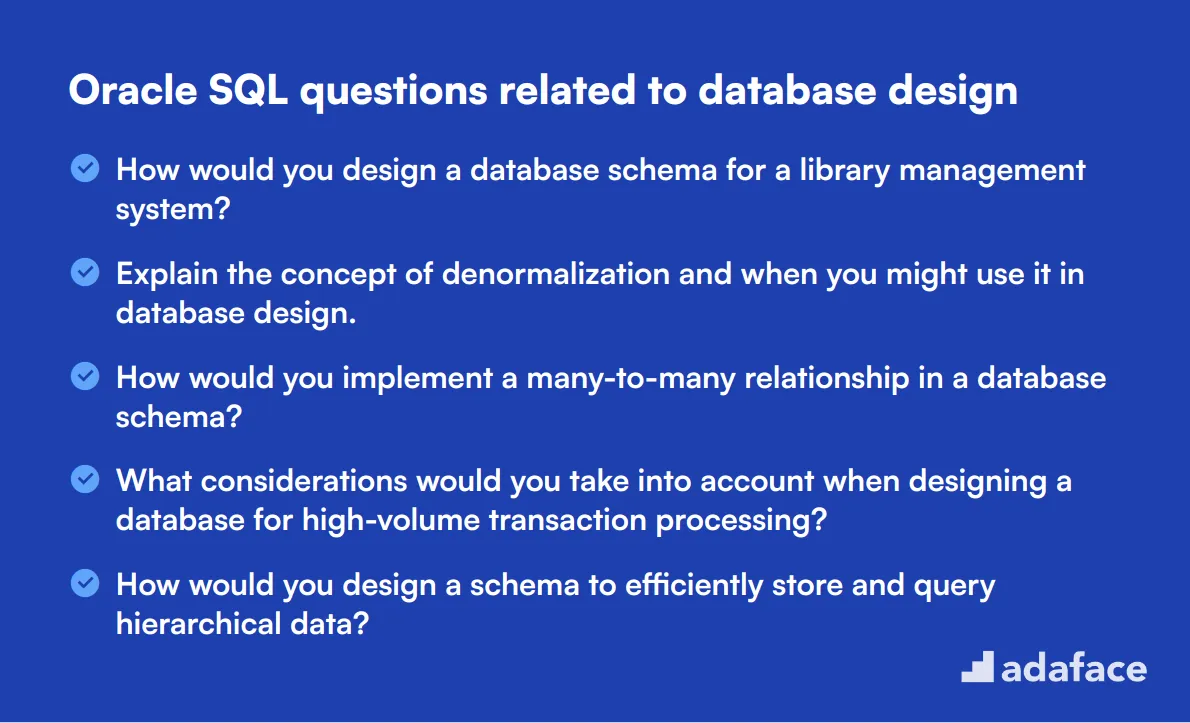
To assess a candidate's proficiency in database design and Oracle SQL, consider using these 12 interview questions. These questions are designed to evaluate the applicant's understanding of crucial concepts and their ability to apply them in real-world scenarios.
- How would you design a database schema for a library management system?
- Explain the concept of denormalization and when you might use it in database design.
- How would you implement a many-to-many relationship in a database schema?
- What considerations would you take into account when designing a database for high-volume transaction processing?
- How would you design a schema to efficiently store and query hierarchical data?
- Explain the concept of database partitioning and when it might be beneficial.
- How would you design a database to handle time-series data efficiently?
- What are materialized views, and how might you use them in database design?
- How would you approach designing a database schema for a multi-tenant application?
- Explain the concept of sharding and its potential benefits in database design.
- How would you design a schema to efficiently handle geospatial data and queries?
- What strategies would you employ to ensure data integrity in a distributed database system?
Which Oracle SQL skills should you evaluate during the interview phase?
While it's impossible to assess every aspect of a candidate's Oracle SQL expertise in a single interview, focusing on core skills can provide valuable insights. Here are the key Oracle SQL skills that interviewers should evaluate to gauge a candidate's proficiency effectively.
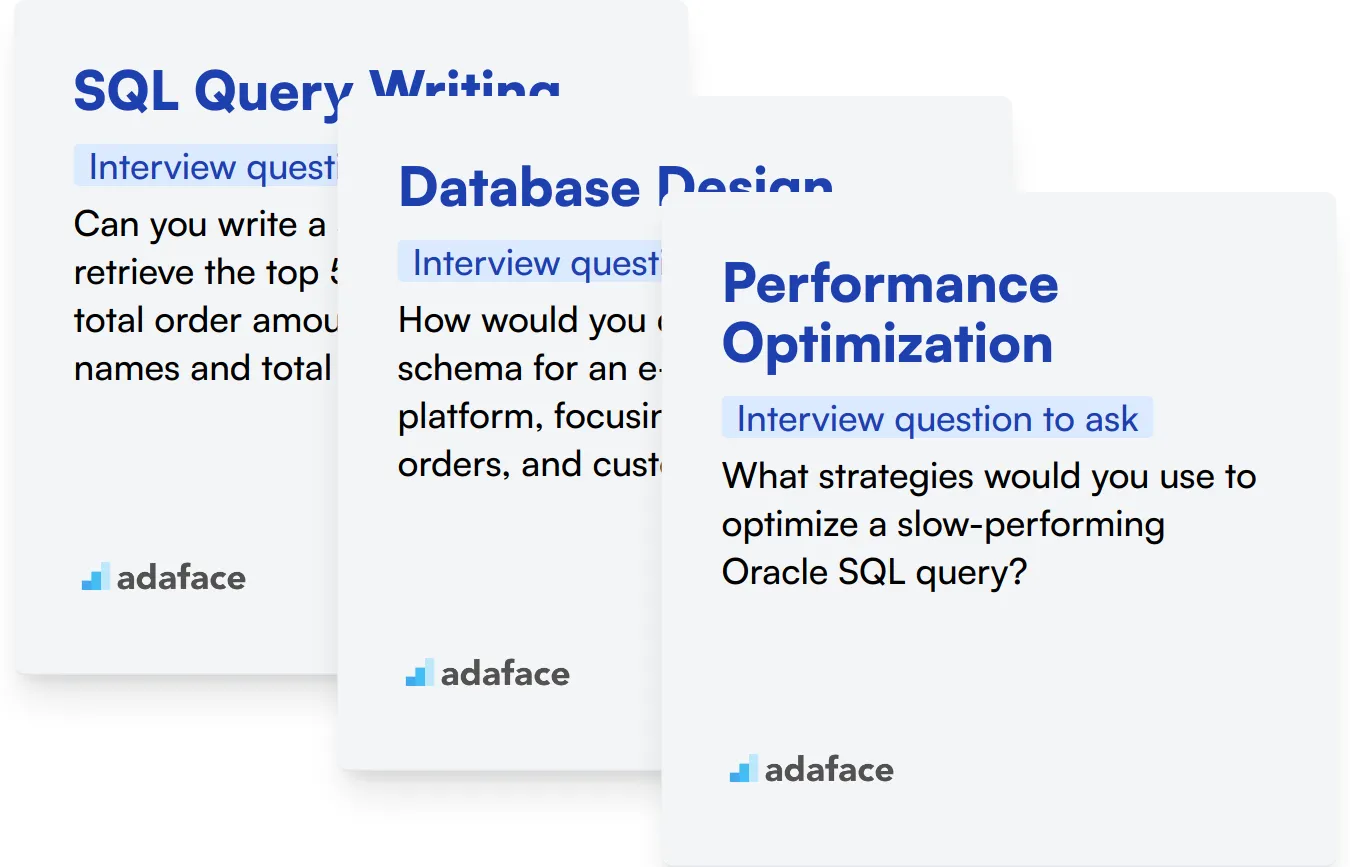
SQL Query Writing
SQL query writing is the foundation of working with Oracle databases. Proficiency in this skill enables developers to retrieve, manipulate, and analyze data efficiently.
To assess this skill, consider using an SQL coding test that includes relevant multiple-choice questions. This can help filter candidates based on their query-writing abilities.
During the interview, you can ask targeted questions to evaluate the candidate's SQL query writing skills. Here's an example question:
Can you write a SQL query to retrieve the top 5 customers by total order amount, including their names and total spend?
Look for the candidate's ability to use JOINs, aggregate functions, and ORDER BY clauses. Pay attention to their approach in handling potential NULL values and their overall query structure.
Database Design
Understanding database design principles is crucial for creating efficient and scalable Oracle SQL databases. This skill impacts performance and maintainability of the entire system.
While there isn't a specific test for database design in our library, you can incorporate relevant questions into your interview process to assess this skill.
To evaluate a candidate's database design skills, consider asking a question like this:
How would you design a database schema for an e-commerce platform, focusing on products, orders, and customers?
Assess the candidate's ability to identify entities, establish relationships, and normalize the schema. Look for considerations of performance, scalability, and data integrity in their design approach.
Performance Optimization
Optimizing Oracle SQL queries and database performance is essential for maintaining efficient systems. This skill can significantly impact application speed and resource utilization.
While we don't have a specific test for Oracle SQL performance optimization, you can incorporate relevant questions into your technical interview process.
To assess a candidate's skills in performance optimization, you might ask:
What strategies would you use to optimize a slow-performing Oracle SQL query?
Look for mentions of indexing, query plan analysis, proper join techniques, and avoiding full table scans. The candidate should demonstrate an understanding of Oracle's query optimizer and how to work with it effectively.
Hire top talent with Oracle SQL skills tests and the right interview questions
When hiring for a role that requires Oracle SQL skills, it's important to accurately assess candidates' abilities. This ensures that you find the right fit for your team.
One of the best ways to evaluate these skills is through specialized skills tests. Consider using our Oracle PL/SQL online test to gauge candidates' proficiency effectively.
After administering the test, you can easily shortlist the top applicants based on their performance. This enables you to focus your interview efforts on the most qualified candidates.
To get started, you can sign up here and explore our full range of Oracle assessment tests tailored for your hiring needs.
Oracle PL SQL Online Test
Download Oracle SQL interview questions template in multiple formats
Oracle SQL Interview Questions FAQs
You should ask a mix of basic concepts, junior-level tasks, SQL queries, and database design questions to get a well-rounded assessment of the candidate's skills.
The number can vary, but this post provides 50 questions across different skill levels and topics, giving you plenty to choose from based on the role and time available.
It's best to tailor your questions based on the specific role and the candidate's experience level. Use a mix of questions from different categories provided in this post.
Include questions about SQL queries and database design, and consider giving a practical test or coding challenge to evaluate their hands-on skills.

40 min skill tests.
No trick questions.
Accurate shortlisting.
We make it easy for you to find the best candidates in your pipeline with a 40 min skills test.
Try for freeRelated posts
Free resources




